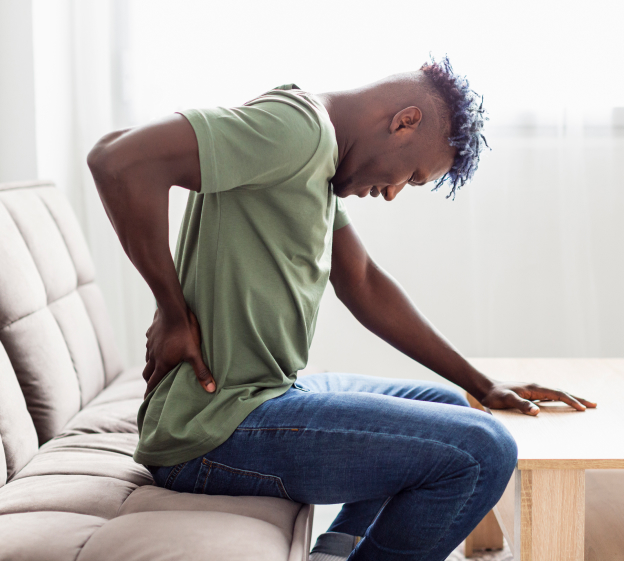
Do your hips hurt? You’re not alone. Hip pain can be a common occurrence as you age. According to research by the American Academy of Family Physicians, 14.3% of adults age 60 and older experience hip pain nearly every day. If you’re one of them, it’s probably time to check in with your primary care provider to determine what’s causing your hip pain.
“Often patients will come in complaining of hip pain, and it turns out they are referring to their buttocks as the location of the discomfort,” says Dr. Vandit Sardana, a board-certified, fellowship-trained orthopedic surgeon at Beaufort Memorial Orthopaedic Specialists. “If the pain is in your buttocks or some other area, it may not be a hip problem.”
A Look Inside Your Hip
To understand the various hip pain causes, it’s helpful to understand the hip joint and its anatomy.
Your hip joint is located near your groin, where the thigh bone and pelvis meet. It’s a ball-and-socket joint made of the femur head (ball) and the pelvis (socket). Ligaments connect the two bones, and soft tissues and major muscle groups, including gluteal muscles, quadriceps and hamstrings surround them. Fluid-filled sacs called bursae and fluids lubricate the joint and help it move.
Because your body is so interconnected, when a problem develops in a bone, ligament, muscle or tendon located in or around the hip, your hip may hurt.
Read More: Want to Avoid a Hip Replacement? Follow These Tips for Healthy Hips
Common Hip Pain Causes
A few common hip pain causes include:
- Arthritis — Pain that starts in the groin area may be caused by arthritis. This chronic condition causes swelling and inflammation around the joints and often develops over time. Osteoarthritis, the most common form of arthritis, is caused by wear and tear on the joint. Rheumatoid arthritis, on the other hand, is an autoimmune disorder that is more common among women and people who smoke or have a family history of the condition.
- Hip bursitis — Pain on your hip’s outer side may be rooted in hip bursitis. Hip bursitis occurs when the bursae that cushion the hip bone become inflamed. Hip injuries and overuse from running, walking and other activities can cause bursitis to develop.
- Hip fractures — A broken thigh bone is a common cause of hip pain among older adults and those with osteoporosis. Falls are the most common cause of hip fractures, which result in sudden, intense pain that makes it difficult to perform weight-bearing activities, such as walking.
- Labral tears — The labrum is the soft tissue that covers the hip socket. When this tissue tears due to injury or another cause, the tear can cause pain and stiffness in the hip. You will likely also experience discomfort in the buttocks and groin and a clicking sensation in the hip area.
- Spine problems — Hip pain that radiates into your back and buttocks may indicate a pinched nerve or other spinal condition.
- Tendinitis — Tendinitis can cause pain where your hips connect with your buttocks. It occurs when the tendons connecting the buttocks to the hip bone become inflamed and is a common cause of acute hip pain.
Read More: Understanding Hip Arthritis and How to Find Pain Relief
Finding the Root of Your Hip Pain
Although knowing the location of your pain is helpful, Dr. Sardana insists that your orthopedic specialist will want more information.
“The location of the pain is just the start of investigating and addressing your pain,” Dr. Sardana says. “We must then move forward to diagnose the cause of your pain. Otherwise, we can’t find a fitting solution.”
To detect the cause of your hip pain, your care team will likely perform imaging tests. Depending on your symptoms, you may undergo an X-ray, MRI or CT scan. Your provider uses information from these studies to pinpoint a diagnosis and determine an appropriate treatment plan.
Conservative Care for Your Hips
In many cases, hip pain resolves with conservative treatment, including:
- Injections — You lie on a table, and your health provider injects anti-inflammatory medication directly into your hurting hip. A corticosteroid injection can provide immediate relief, but it may take a few days to feel a noticeable difference.
- Massage therapy — A professional massage therapist may help relieve pain in various joints, including your hips.
- Medication — Over-the-counter anti-inflammatories help reduce pain and inflammation. When over-the-counter options leave you in pain, prescription medications may help.
- Physical therapy — A physical therapist helps you perform exercises to stretch and strengthen the muscles in your hips, back and legs that contribute to your hip pain.
- Rest — Your pain may worsen when you stand or walk. By temporarily avoiding these activities, you may reduce the pain you experience.
Read More: What You Need to Know About Cortisone Injections
Finding Relief From Hip Pain in the Operating Room
While many cases of hip pain heal at home, some require surgical intervention.
“Our goal is to bring health and healing with the least invasive approach possible,” Dr. Sardana says. “Sometimes, a hip problem is so extensive that surgery offers the only road for improvement.”
Hip fractures and arthritis are two hip pain causes that often require surgery, such as:
- Repair — If your hip bone breaks, an orthopedic surgeon repairs the bone and restores function. Following recovery, you should regain use of your hip without pain.
- Replacement — When your hip joint degenerates due to arthritis, you may experience chronic pain and difficulty balancing. Hip replacement surgery replaces your hip’s ball-and-socket joint with artificial components, providing a long-term solution to your painful problem.
Read More: Having a Total Hip Replacement? Here’s What to Expect
Following these orthopedic procedures, physical therapy helps you recover as quickly and fully of possible.
Don’t Ignore Your Hip Pain
Whether rooted in your hip or one of the nerves, muscles and tendons surrounding it, hip pain is treatable. Medical advances have led to increasingly sophisticated treatments, allowing your provider to recommend a treatment option that helps prevent hip pain from slowing you down.
Before your orthopedic surgeon can help relieve your pain, you have to help yourself.
“Speak up about your problem,” Dr. Sardana says. “You may think hip pain is a normal part of aging, but you don’t have to make peace with it. By speaking up, you take the first step toward finding relief from all sorts of hip pain causes.”
Have pain in your hip? Request an appointment with an orthopedic surgeon at Beaufort Memorial who can get to the root of your pain and offer a solution.


